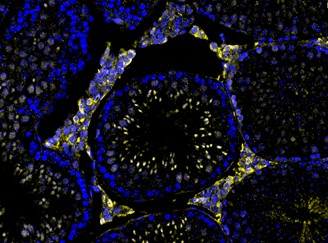A naturally occurring anti-viral protein first discovered at Hudson Institute is proving essential to human sexual health, even playing a part in protecting against cancer, with new proof that it's an Important factor for men as well as women.
The latest research highlighting the vital role played by interferon epsilon (IFNε) shows that it plays a critical role in protecting the male reproductive tract against virus infection, thereby protecting male fertility.
Lead researcher, Dr Rukmali Wijayarathna said testes can harbour a range of viruses, affecting not only male fertility, reproductive health and well-being, but also the health of the partners and children of infected men.
"Many viruses are transmitted via semen, because these viruses can 'hide' in the testis due to its specialised immune environment, however, our understanding of anti-viral defences in the testis is lacking," Dr Wijayarathna said.
"Our latest research, published in PLOS Pathogens, showed that IFNε is expressed in testicular immune cells, but more significantly in cells that develop into sperm, in both mice and humans."
Crucial for male sexual health
"We have been able to show that IFNε plays a crucial role in protecting the male reproductive system against viruses," she said.
"While this study focuses on a model using the Zika virus, which is currently rare in Australia, our findings will be directly applicable to any viral-induced disease likely to be persistent in the male reproductive tract."
The repercussions of these findings go beyond just male sexual health – men who are otherwise healthy can transmit the Zika virus via semen for over a year, posing a transmission risk to female partners which may cause still birth and birth defects in their children.
That makes this research important not only for male health, but also hugely significant for its potential impact on female and child health outcomes.
Crucially, the research suggests that defects in IFNe activity may be an important, but hitherto unsuspected, cause of susceptibility to viral infections in the male tract.
Discovery of IFNε
Since Professor Paul Hertzog first Identified IFNε 21 years ago, he and his team at Hudson Institute have shown that it acts as a natural booster of immunity to infections, with potential uses in treating a range of conditions including ovarian cancer and endometriosis.
Now, working with Senior Principal Research Fellow Professor Mark Hedger and collaborators in Germany, Dr Wijayarathna has laid the groundwork for future work developing IFNe as a therapy for testicular viral infections, and for better understanding of the impact of viral infections on male infertility and their impact on the success of assisted reproductive technologies in particular.
"Over 1 million sexually-transmitted infections are acquired every day worldwide, with more than half due to viruses, such as herpes simplex and HIV," she said.
"SARS-CoV2 has emerged as a significant risk for male reproductive health, but recent outbreaks of Mumps, Zika, Epstein-Barr virus and other SARS-related viruses are also of considerable concern."
"These viruses can infect the testis, potentially impairing fertility, and compromising the health of the partners and offspring of infected men."







